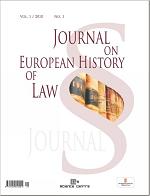The Private Law Elements of Citizenship Law in the 19th Century
The Private Law Elements of Citizenship Law in the 19th Century
Author(s): Norbert VargaSubject(s): Law, Constitution, Jurisprudence
Published by: Evropská společnost pro právní dějiny, z.s.
Keywords: Citizenship; public law; Hungarian constitutional history; legitimization; naturalization; marriage; concept of citizenship; loss of citizenship; private law; foreign citizens; family law; illegitimate child.
Summary/Abstract: The bourgeois transformation created the conditions subsequent to which the demand for statutory regulation of Hungarian citizenship could emerge. The codification of citizenship law was helped by the appearance of the idea of sovereignty and of the principle of equality before the law. The development of a bourgeois state organisation striving to rid itself from the vestiges of feudalism made the reform of citizenship law, as one of the elements of state sovereignty, unavoidable. The bourgeois transformation played a major role not only in the extension of the principle of equality before the law, but also in changing the meaning and the content of the concept of citizenship. Citizenship was an expression of the legal relationship existing under public law between a state and its citizen. In the public law of feudalism, this concept did not exist. As a result of this process, citizenship law also became a part of public law in Hungary (act L of 1879), despite the fact that certain elements of private law continued to play a role in case of both the acquisition and the loss of citizenship.
Journal: Journal on European History of Law
- Issue Year: 2/2011
- Issue No: 1
- Page Range: 79-85
- Page Count: 6
- Language: English

